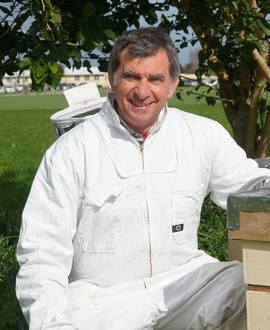The Importance of Protecting Bees

Wednesday, 21 Sep 2022
By Toi Ohomai Expert:
Omar Martinez, Academic staff Member, Apiculture
Bees are vital to many industries in Aotearoa and around the world, but according to Albert Einstein, if they disappeared, man would only survive for four years.
Omar Martinez is training the next generation of professional and hobby beekeepers in a bid to keep New Zealand’s bee population thriving.
The tutor at Toi Ohomai says the surge in popularity of beekeeping as a hobby is great for the environment but more knowledge needs to be shared about pests and diseases putting beehives at risk.
The sentiment is shared by Apiculture New Zealand, which celebrates Bee Aware Month every September in a bid to educate people about bees and how to protect them.
Omar’s love of apiculture and bees started when he was a child, and it is something that he believes is his vocation.
“When I was a little boy, my father used to read me books about animals. One of them was about the honeybees in the wild. When I was six, I saw live bees, their brood, and combs through an observational beehive. It fascinated me.”
He learnt about apiculture in high school in Argentina, which secured his love of bees.
“My formal and more extensive learning about bees was when I was at University when a lecturer explained about propolis, and I just wanted to learn more."
Omar took a one-year apiculture course and the rest is history.
“That was where my real vocation and passion for the honeybees took place.”
Omar has been teaching at Toi Ohomai since 2018 and says no two days are the same.
“I love everything about my job. I love my team, teaching, encouraging people, unfolding the mystery about the world of the bees and being rewarded any time my graduates say they are doing well.”
With an increase in people taking up apiculture as a hobby, Omar says pollinating your garden is not enough.
“Every day people get more interested in a sustainable activity that gives joy and some profit. Honeybees undoubtedly are gaining more fans. But loving bees and pollinating your gardens is not enough, you must know what is going on, and what pests and diseases are putting our beehives collectively at risk.
“In terms of avoiding pests and diseases, there are many actions we must do. If we don’t, it will have a direct negative effect on the industry and subsidiary industries. As a society, I think it is time we made an effort to think more holistically about it.”
Other challenges facing the industry include getting all beekeepers registered to get rid of American Foulbrood (AFB) in the next 10 years.
“Another thing that is needed is to diversify products for export, from other types of honey to products with propolis, including packages of bees and queens to the northern hemisphere. The production of bee venom is something of a novelty in New Zealand, but there should be an interest from the local pharmaceutical industry to develop and export it.”
Omar says there’s a demand for apiculture graduates, both seasonally and permanently.
“People choose what pathways is the best for them. I am rewarded to know that some of our graduates are working in the industry and that some are successfully hobbyists. I have some that have also ventured into their own company by buying hives to pollinate and produce honey, among other products.”
With ecological threats rapidly changing Omar says the best way to stay up to date is to study apiculture.
“Keep informed, if possible be a member of Apiculture New Zealand or any associated beekeeping club. There is always something new that you must know.
“If you want to start beekeeping as a hobbyist beekeeper, be a ‘professional hobbyist’, meaning your mentality should be the same as if you had thousands of beehives. Follow all legal compliances, check for visual signs of AFB on your beehives a minimum of twice a year (Spring and Autumn), do varroa treatments as they have been researched in this country. Beekeepers must be registered and this has many advantages. If you are a semi-commercial or a commercial beekeeper, train your staff. Practices and treatment evolve. Be ready!”
Find out more about this course: New Zealand Certificate in Apiculture (Level 3) [Beekeeping]
